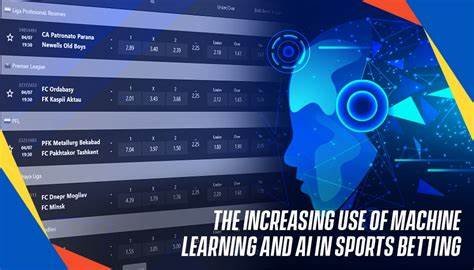The world of sports betting is undergoing a revolutionary transformation, thanks to the power of machine learning. As we move through 2024, AI technologies are increasingly shaping the way bets are placed, enhancing accuracy, and improving user experiences. This article explores how machine learning is redefining sports betting and what bettors can expect from these advancements.
The Rise of Machine Learning in Sports Betting
Machine learning, a subset of artificial intelligence, involves algorithms that learn from data and make predictions. In sports betting, these algorithms analyze vast amounts of historical data, player statistics, and game outcomes to provide accurate predictions and betting insights.
Data-Driven Predictions
One of the primary ways machine learning is transforming sports betting is through data-driven predictions. By analyzing historical data, machine learning models can identify patterns and trends that human analysts might overlook. These insights enable bettors to make more informed decisions, increasing their chances of winning.
Real-Time Analysis
Another significant advantage of machine learning in sports betting is real-time analysis. Machine learning algorithms can process and analyze data in real-time, providing up-to-the-minute insights on games, player performance, and other relevant factors. This real-time analysis allows bettors to adjust their strategies quickly, maximizing their potential for success.
Enhancing User Experience with AI
AI-powered technologies are not only improving the accuracy of predictions but also enhancing the overall user experience in sports betting.
Personalized Betting Recommendations
Machine learning algorithms can analyze individual betting patterns and preferences to offer personalized recommendations. These tailored suggestions can help bettors identify the best opportunities based on their unique betting history and preferences, making the betting experience more enjoyable and engaging.
Chatbots and Virtual Assistants
AI-driven chatbots and virtual assistants are becoming more prevalent in the sports betting industry. These tools provide users with instant support, answer questions, and offer betting tips, making the betting process smoother and more accessible. By leveraging natural language processing, these AI tools can understand and respond to user queries effectively.
Ethical Considerations and Challenges
While the integration of machine learning in sports betting offers numerous benefits, it also raises ethical considerations and challenges.
Fairness and Transparency
One of the primary concerns is ensuring fairness and transparency in AI-driven betting systems. Bettors need to trust that the algorithms used are unbiased and that the predictions provided are based on accurate data. Ensuring transparency in how these models operate is crucial for maintaining this trust.
Data Privacy
Another challenge is data privacy. With the vast amounts of data being processed by machine learning algorithms, protecting user information is paramount. Sports betting platforms must implement robust security measures to safeguard sensitive data and comply with data protection regulations.
The Future of AI in Sports Betting
The future of sports betting looks promising with the continued advancement of AI and machine learning technologies.
Predictive Analytics
Predictive analytics will play an even more significant role in the future of sports betting. As machine learning models become more sophisticated, their ability to provide accurate predictions will improve, offering bettors more reliable insights and enhancing their overall betting experience.
Integration with Other Technologies
We can also expect to see increased integration of AI with other emerging technologies, such as blockchain and virtual reality. Blockchain can enhance transparency and security in sports betting, while virtual reality can provide immersive betting experiences, taking user engagement to new heights.
Responsible Gambling
AI can also promote responsible gambling by identifying and flagging problematic betting behaviors. Machine learning algorithms can analyze betting patterns and detect signs of addiction, enabling platforms to offer timely interventions and support to those in need.
Conclusion
As we navigate through 2024, the impact of machine learning on sports betting is undeniable. From data-driven predictions and real-time analysis to personalized recommendations and AI-powered assistants, the integration of AI technologies is revolutionizing the industry. However, it’s essential to address ethical considerations and challenges to ensure a fair, transparent, and secure betting environment. With continuous advancements in AI, the future of sports betting holds exciting possibilities for both bettors and the industry as a whole.
Related Article: Unveiling the Secrets: How AI is Transforming Online Casino Gaming



